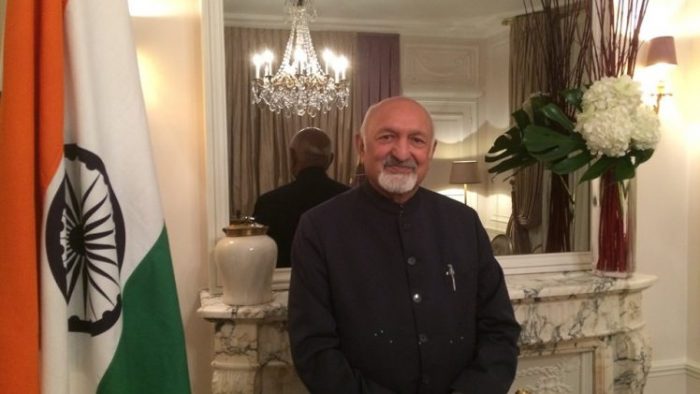Situated in forested countryside, four km away from the cliffs of Caux and 12 km from Fécamp in the north of France, Ayurveda Guru Kiran Vyas’s Tapovan campus offers a calm, serene and relaxing atmosphere close to the refreshing air of the sea. It is only a small walk away from the beaches of Petites Dalles whose beauty inspired the paintings of Monet and Delacroix.
Born in 1944 in pre-Independence India, Vyas was influenced equally by the philosophy of Mahatma Gandhi, with whom his father worked, as well as by Sri Aurobindo. His father was a close associate of Sardar Vallabhai Patel and was asked by the great Indian leader to look after Sabarmathi Ashram when both Patel and Gandhi were sentenced to jail during India’s Independence struggle.
Vyas’s father was given the responsibility of developing and working on Gandhi’s vision of an Indian education – self-reliant and community driven – with half the time spent on work and the other half on academics. Only four when Gandhi was assassinated, Vyas says Gandhi has had a major influence on his way of thinking, with his own father wearing khadi ‘till his last breath.’
Reminiscing on the past, Vyas says, “Historically when I look back at India at what India has done and where India stands today it is very interesting to note that India is an energy by itself.” Having lived in France for over four decades, he speaks about the journey of Ayurveda and Yoga in France in particular and Europe at large.
How was India perceived in France during your early days?
When I first came to Europe, Indian culture was much appreciated particularly in France and Germany. In fact 40-50 years ago, the elite in France would think it very fashionable to be a little Indianised. They would read Indian works and quote either Tagore, Gandhi or Sri Aurobindo. They would organise feasts or a festival and would tell everyone to come in Indian attire. The elite were very interested in Indian culture.
French youth were extremely attracted to India and Indian culture because many Indian writings were translated into French. Right from the beginning of the 20th century, from 1914 onwards, many writings of Indian culture and philosophy were translated into French and so the impact was very deep. Mother, at Aurobindo Ashram, was from France and she influenced a lot of French people towards Indian culture. Many great French authors and poets came to India and stayed for a long time.
France is very aware and open to Indian music. In fact all the great maestros of Indian music come very often to France, so much so that you can experience more Indian music recitals in Paris than in Bombay or Delhi. It is quite interesting that ‘Indianess’ in music, art, dance is much appreciated here.

How did you establish Tapovan in France?
When I first came to France there were some Yoga practices but it was more like gymnastics. It was the dancers and acrobats who were attracted to Yoga practice. There was a total lack of breathing practices.
I had a great opportunity as I was also working at UNESCO in the 1970s in the educational sector. Once the wife of Director General Amadou-Mahtar M'Bow came to me and asked me to be present at an evening reception dinner. I told her that I personally don’t like these kind of events where people drink champagne, what with me being a soft drink kind of person.
But she told me that each time when I was there, especially when I was standing next to her husband - the Director General, he would feel much quieter, and was also able to express himself better especially in difficult situations like when he was with the President of America or some Prime Ministers or with other people. She really wanted to ask me what the secret of my composure was.
I told her that it was perhaps because I practice Yoga, to which she asked what Yoga was. �I told her that Yoga is fundamentally a practice of inner search. Externally, it is true that when we practice asanas and pranayama, it makes us more even tempered and quietens the mind. It also gives us good health and opens up our consciousness.
She suggested immediately that we start a Yoga class in UNESCO. We had regular classes and I asked them for a place for meditation in the UNESCO building. So slowly people started taking keen interest in yoga and meditation. But my serious work started in 1982 when I founded Tapovan - a Centre for Yoga and Ayurveda. Now it has developed into Tapovan Open University of Yoga and Ayurveda with the head office in Paris.
In Normandy we have around 25 acres of campus where we have planted more than 7,000 trees. It has become a very friendly, eco-friendly place like some of the old ashramas. That was the concept I had in my mind and we have developed it accordingly. The climate here does not allow us to grow all the medicinal plants so we bring some of them from India. But France has some West Indies islands like Guadeloupe and Martinique which have a similar climate as that of India where turmeric and some other spice can be grown. We try to grow as much as we can as there are very strict restrictions regarding the importing of medicines from India.

What is the policy and attitude towards Ayurveda in Europe today?
At present most of the Western Governments are against Ayurveda as a medicine. The WHO has accepted Ayurveda as a medicine but the world at large is allopathic minded, even though it is allowed as a medicine. We can use it as a well-being programme in Europe and elsewhere. I was perhaps the first in Europe, especially in France, to practice Ayurveda.
When I started in the 1970s, the word was not even known. It has taken 40 years to get Ayurveda introduced into society. At present I am even teaching Ayurveda in the Medical College here. Certain practices of Ayurveda they are now willing to accept in what is known as ‘pain management’ and ‘wellness programmes’. To help in prevention and also to have it as a secondary practice to help patients. But as a medical practice, let us be very clear, as yet, it is not a legal medicine.
For the last 10 years I have been bringing many doctors to India to learn Ayurveda and since the last 20 years I am holding an international symposium in Normandy, and slowly more and more people are accepting the basic principles of Ayurveda. �
I usually start by telling people that Yoga and Ayurveda are the two greatest gifts of India to humanity, to planet earth. I tell them that the health of a human being depends on the health of our planet earth. I also tell them that a human being’s health health is not just for the body - it includes the body, mind and feelings. There is the pranamayakosha – the body of energy, the manamayakosha - the body of the mind, and then ofcourse the psychic and spiritual body. All of our being should be treated, to be in good health. People are becoming more and more aware of this.�
Should Ayurveda and Yoga be practiced and preserved as a traditional Indian science?
I believe that since these two traditions have come from India, they should remain faithful to our ancient Ayurvedic texts like Charaka, Sushrutha, Vagbhata and Yoga to Patanjali’s Yogasutras. But these practices should also be seen from the modern perspective. The 20th Century as far as Yoga is concerned, right from the Raj Yoga practices of Vivekananda, and then Sri Aurobindo, has given us some of the most scientific approaches towards Yoga and a spiritual life. Intellectually and scientifically, I would say that Vivekananda, Ramana Maharishi and Sri Aurobindo are the three great personalities of modern yoga.
Westerners have only taken yoga as a physical exercise that too only asanas. This is a very limited approach to Yoga. The spiritual quest is the approach of India. However, even while the world is practicing these asanas they are turning by themselves to Indian spirituality and that is the beauty of the practice of yoga. Even though they only practice the asanas, they feel the need within themselves to go towards the source that is India, to go towards that hidden thing which is spirituality, which is behind each of these things. I find that a very great achievement on the part of all the teachers, and all the practitioners of Hata Yoga. In the last 40 years that I have been teaching here, I have seen a transformation take place.

Has the practice of Ayurveda and Yoga influenced people’s lifestyles in France?
Since the time I started, these two practices have played a very important role in people becoming vegetarian. Basically, Ayurveda is not a vegetarian practice. In Ayurveda one can eat meat, fish, anything. But at the same time, as far as health is concerned, Ayurveda recommends that one be a vegetarian after the age of 40 or 50 as eating meat causes more pain due to arthritis and other problems.
If you want to practice yoga, becoming vegetarian is almost a necessity. It is true that without imposing on anybody, the influence of Tapovan and our classes have made so many people vegetarian. They may be eating things when they are with their families from time to time for some social functions but they are largely vegetarian otherwise.





